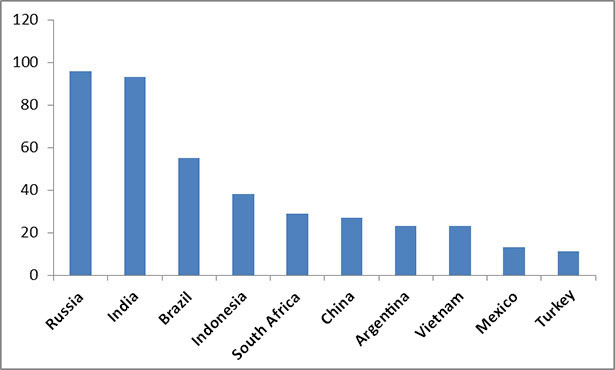Appetite comes with eating; export appetite with exporting. At least that's what we'd like to believe. Nevertheless, the world trade menu could leave the odd bone stuck in your throat: just under 800 trade barriers have been introduced over the last year or so - with no end in sight.
Russia, India, Brazil, Indonesia, South Africa, China, Argentina, Vietnam, Mexico and Turkey are the frontrunners: these emerging markets have had enough of freeloaders eating off their plates, and they're letting them know. Increased customs duties or deviations from standards and guidelines often go largely unnoticed, except by the companies affected. Who has honestly heard of the import ban on rice in Gambia, or the taxes imposed on Chinese citric acid by Kazakhstan? Strung together, these measures counteract the idea of a global feast, where anyone - provided they're competitive - can look for a customer in Singapore or Ecuador, regardless of whether they are a German or Chinese manufacturer.
Implementing TTIP would provide a great opportunity for small and medium-sized companies in France to conquer the American continent. At the same time, it would serve as the largest trade barrier in the world, as (currently) it would exclude Africa and Asia from enjoying the delicacies on offer on the European and American buffet.
The future will show whether everything will fall in line. Until then, the global export menu will continue to offer an appetizer consisting of price pressure and deflation, followed up with an entrée of protectionism ragout, all washed down with a delicious dessert of payment default. In 2015 the global export industry will miss out on 560 billion US dollars in revenue as a result of this menu of vicious customs duty surprises and rising payment delays, combined with political risks and currency risks.
Only in a few three-star restaurants are you now allowed to help yourself from your neighbor's plate. These havens include Colombia, Poland and the United Arab Emirates; countries with no excessive trade barriers, where imports are growing significantly thanks to good economic framework conditions.
Russia, India, Brazil, Indonesia, South Africa, China, Argentina, Vietnam, Mexico and Turkey are the frontrunners: these emerging markets have had enough of freeloaders eating off their plates, and they're letting them know. Increased customs duties or deviations from standards and guidelines often go largely unnoticed, except by the companies affected. Who has honestly heard of the import ban on rice in Gambia, or the taxes imposed on Chinese citric acid by Kazakhstan? Strung together, these measures counteract the idea of a global feast, where anyone - provided they're competitive - can look for a customer in Singapore or Ecuador, regardless of whether they are a German or Chinese manufacturer.
TTIP: without Asia and Africa
Implementing TTIP would provide a great opportunity for small and medium-sized companies in France to conquer the American continent. At the same time, it would serve as the largest trade barrier in the world, as (currently) it would exclude Africa and Asia from enjoying the delicacies on offer on the European and American buffet.
The future will show whether everything will fall in line. Until then, the global export menu will continue to offer an appetizer consisting of price pressure and deflation, followed up with an entrée of protectionism ragout, all washed down with a delicious dessert of payment default. In 2015 the global export industry will miss out on 560 billion US dollars in revenue as a result of this menu of vicious customs duty surprises and rising payment delays, combined with political risks and currency risks.
Only in a few three-star restaurants are you now allowed to help yourself from your neighbor's plate. These havens include Colombia, Poland and the United Arab Emirates; countries with no excessive trade barriers, where imports are growing significantly thanks to good economic framework conditions.

